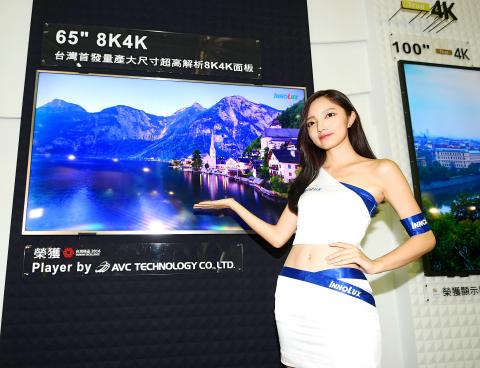Taiwan’s LCD panel makers are facing a bumpy road in developing next-generation technology as chances are fading that the government will support the costly development, a TrendForce Corp (集邦科技) analyst said yesterday.
The Ministry of Economic Affairs last month said that it was considering injecting as much as NT$10 billion (US$318.5 million) to help firms develop flexible active-matrix organic light-emitting diode (AMOLED) technology and to form a “national team” to build a supply chain to collectively support the development of the technology.
However, the government has been stuck in limbo since then, with no funding plan or development blueprint on the horizon.

Photo: Fang Pin-chao, Taipei Times.
“We do not have high hopes that the government will support the development,” TrendForce analyst Iris Hu (胡家榕) told the Taipei Times by telephone. “It is just a verbal commitment.”
In contrast to the inertia of Taiwan’s government’s, the Chinese and South Korean governments are aggressively assisting their LCD panel manufacturers foray into AMOLED technology as the investments will be several times higher than building an LCD production line, Hu said.
“For local LCD panel suppliers, which just emerged from chronic losses, the government’s funding will be critical,” Hu said. “Without the government bankrolling the project, things could become really difficult.”
AU Optronics Corp (AUO, 友達光電), the nation’s No. 2 LCD panel maker, last month highlighted the need for government support, as it would cost a company more than NT$10 billion to develop AMOLED technology.
“Not a single company from Taiwan can afford it on its own,” AUO chairman Paul Peng (彭双浪) said at the time.
The Hsinchu-based company told investors in July that it would stop wasting money on the development of large OLED panels and focus instead on producing smaller OLED panels used in wearable and virtual reality devices.
Innolux Corp (群創), in which Hon Hai Precision Industry Co (鴻海精密) has a major stake, recently said that it planned to develop flexible AMOLED technology, but it did not provide concrete details.
Analysts said it all depended on what resources Innolux could obtain after the tie-up of Hon Hai and Sharp Corp.
Sharp is developing OLED technology and is making better progress, they said.
“Taiwanese are losing ground in OLED to [South] Korean vendors,” CIMB Securities Ltd said in a report released earlier this month.
Most key equipment, critical material and production tools were fully booked by South Korean and Chinese firms for delivery over the next 18 months to 24 months, CIMB said, citing its recent surveys with OLED supply-chain firms.
Investors who expected Innolux to leverage Sharp’s IGZO technology for producing OLED mobile displays would be disappointed as the technology is suitable for producing OLED TV panels, but was unlikely to be commercialized within the next two years, CIMB said.
The brokerage said it was concerned about Taiwan’s LCD sector as the recent price uptrend is supported by seasonal demand, with the strength of price hikes appearing to diminish.

RUN IT BACK: A succesful first project working with hyperscalers to design chips encouraged MediaTek to start a second project, aiming to hit stride in 2028 MediaTek Inc (聯發科), the world’s biggest smartphone chip supplier, yesterday said it is engaging a second hyperscaler to help design artificial intelligence (AI) accelerators used in data centers following a similar project expected to generate revenue streams soon. The first AI accelerator project is to bring in US$1 billion revenue next year and several billion US dollars more in 2027, MediaTek chief executive officer Rick Tsai (蔡力行) told a virtual investor conference yesterday. The second AI accelerator project is expected to contribute to revenue beginning in 2028, Tsai said. MediaTek yesterday raised its revenue forecast for the global AI accelerator used

TEMPORARY TRUCE: China has made concessions to ease rare earth trade controls, among others, while Washington holds fire on a 100% tariff on all Chinese goods China is effectively suspending implementation of additional export controls on rare earth metals and terminating investigations targeting US companies in the semiconductor supply chain, the White House announced. The White House on Saturday issued a fact sheet outlining some details of the trade pact agreed to earlier in the week by US President Donald Trump and Chinese President Xi Jinping (習近平) that aimed to ease tensions between the world’s two largest economies. Under the deal, China is to issue general licenses valid for exports of rare earths, gallium, germanium, antimony and graphite “for the benefit of US end users and their suppliers

Dutch chipmaker Nexperia BV’s China unit yesterday said that it had established sufficient inventories of finished goods and works-in-progress, and that its supply chain remained secure and stable after its parent halted wafer supplies. The Dutch company suspended supplies of wafers to its Chinese assembly plant a week ago, calling it “a direct consequence of the local management’s recent failure to comply with the agreed contractual payment terms,” Reuters reported on Friday last week. Its China unit called Nexperia’s suspension “unilateral” and “extremely irresponsible,” adding that the Dutch parent’s claim about contractual payment was “misleading and highly deceptive,” according to a statement

Artificial intelligence (AI) giant Nvidia Corp’s most advanced chips would be reserved for US companies and kept out of China and other countries, US President Donald Trump said. During an interview that aired on Sunday on CBS’ 60 Minutes program and in comments to reporters aboard Air Force One, Trump said only US customers should have access to the top-end Blackwell chips offered by Nvidia, the world’s most valuable company by market capitalization. “The most advanced, we will not let anybody have them other than the United States,” he told CBS, echoing remarks made earlier to reporters as he returned to Washington